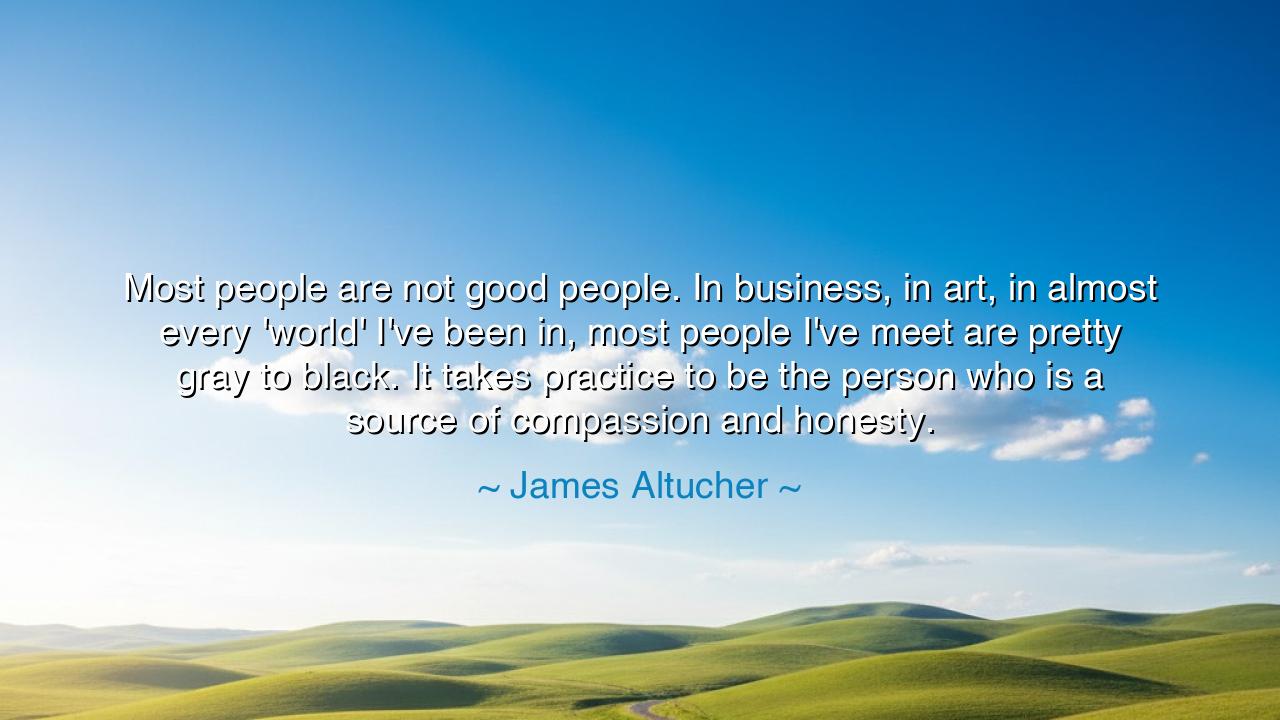
Most people are not good people. In business, in art, in almost
Most people are not good people. In business, in art, in almost every 'world' I've been in, most people I've meet are pretty gray to black. It takes practice to be the person who is a source of compassion and honesty.






Host: The room was quiet, the soft light of the evening casting a peaceful glow. Outside, the world had darkened, and the soft hum of the night was all around. Jeeny sat at the table, her fingers lightly tracing the edge of her cup, her thoughts clearly deepening. Jack, standing by the window, gazed out at the darkened sky, lost in thought. The stillness between them felt comfortable, yet there was an underlying tension, as though a difficult but meaningful conversation was about to unfold.
Jeeny: (breaking the silence, her voice steady but reflective) “I came across something by James Altucher today that really made me think. He said, ‘Most people are not good people. In business, in art, in almost every 'world' I've been in, most people I've met are pretty gray to black. It takes practice to be the person who is a source of compassion and honesty.’ What do you think about that?”
Jack: (pauses, his voice thoughtful) “It’s a bit of a harsh view, isn’t it? But I can see where he’s coming from. The world, especially in business and competition, often seems to bring out the grayness in people—the self-interest, the hidden motives, the lack of transparency. It’s easy to assume that most people, when faced with their own desires and needs, will act from a place of self-preservation rather than genuine compassion.”
Jeeny: (nodding slowly) “Yes. He’s saying that while we might hope for more honesty and goodness in the world, the reality is that it takes conscious effort to stand apart from that—especially in environments where it’s easy to be indifferent or self-serving. It’s not about the natural inclination of people to be good, but about the discipline and practice it takes to consistently choose compassion and honesty over convenience or personal gain.”
Host: The stillness in the room deepened as the conversation took on a more serious tone. Jack turned toward Jeeny, his gaze softer now, reflecting on the idea of moral practice and the effort required to maintain integrity in a world that can sometimes feel transactional. Outside, the world had quieted, but inside, their conversation felt like it was cutting to the core of something much larger—about human nature, personal responsibility, and the challenges of staying true to our values.
Jack: (his voice quieter, more reflective) “I think it’s a sobering thought, but it also speaks to the challenge we face in trying to be better people. It’s not easy to act with compassion and honesty when it feels like those values aren’t always rewarded. The world often rewards pragmatism or winning, not kindness or transparency. It takes effort to keep practicing those virtues in the face of that reality.”
Jeeny: (gently) “Exactly. It’s about resilience, about choosing to show up as your best self every day, even when it’s difficult or doesn’t come naturally. It’s easy to get lost in the gray areas, to blend in with the way others act. But the real work comes when we consciously choose to act from a place of goodness, no matter the situation. It’s not just an instinct—it’s something we have to cultivate.”
Jack: (pauses, smiling faintly) “I guess that’s the difference, isn’t it? It’s not about being perfect. It’s about having the awareness to see when we’re acting from a place of self-interest, and then making the decision to act with integrity anyway. It’s about practicing compassion and honesty, even when it’s not easy, and not waiting for the world to change first.”
Jeeny: (nodding, her smile warm) “Yes, it’s about accountability to ourselves. In a world where most people might gravitate toward gray areas or self-interest, the real strength comes from choosing to be different—to be the person who consistently practices kindness, honesty, and compassion. That’s how we stand out. It’s not about being perfect, but about being committed to being our best selves.”
Host: The quiet in the room deepened as the conversation settled into a shared understanding. Outside, the world had slipped into night, but inside, the realization that staying true to compassion and honesty takes practice, commitment, and personal effort had found its place. Jeeny and Jack sat together, reflecting on the idea that while it’s easy to fall into self-interest, the true challenge—and the true strength—comes from the conscious choice to practice kindness and integrity, no matter the world around us.
Jack: (smiling softly) “Maybe that’s the real test—how consistently we practice being good, how much effort we put into staying true to our values, even when the world around us isn’t making it easy.”
Jeeny: (nodding) “Yes, and that’s what makes it so powerful. Compassion and honesty aren’t just natural traits; they’re choices. And it’s the practice of those choices, day in and day out, that truly defines who we are.”
Host: The room, once quiet, now felt full of understanding. Jeeny and Jack had touched on a profound truth—that while the world can often bring out the grayness in people, it’s the conscious practice of compassion, honesty, and integrity that can shape a better world. It’s about making those choices every day, even when it’s difficult, and showing up as our best selves, no matter what. The world outside had quieted, but inside, the room felt full of that quiet resolve to choose goodness, no matter the circumstances.






AAdministratorAdministrator
Welcome, honored guests. Please leave a comment, we will respond soon